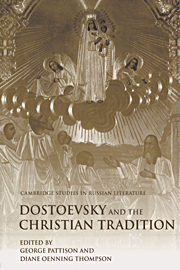Book contents
- Frontmatter
- Contents
- Notes on contributors
- Acknowledgments
- Notes on conventions and abbreviations
- Introduction: Reading Dostoevsky religiously
- PART I DOSTOEVSKY AND THE PRACTICE OF ORTHODOXY
- PART II DOSTOEVSKY AND CHRISTIAN THEOLOGY
- 5 Dostoevsky in the prism of the orthodox semiosphere
- 6 The categories of Law and Grace in Dostoevsky's poetics
- 7 The Brothers Karamazov as trinitarian theology
- 8 Reading and incarnation in Dostoevsky
- PART III READING DOSTOEVSKY RELIGIOUSLY: CASE STUDIES
- Bibliography
- Index
- CAMBRIDGE STUDIES IN RUSSIAN LITERATURE
6 - The categories of Law and Grace in Dostoevsky's poetics
Published online by Cambridge University Press: 02 December 2009
- Frontmatter
- Contents
- Notes on contributors
- Acknowledgments
- Notes on conventions and abbreviations
- Introduction: Reading Dostoevsky religiously
- PART I DOSTOEVSKY AND THE PRACTICE OF ORTHODOXY
- PART II DOSTOEVSKY AND CHRISTIAN THEOLOGY
- 5 Dostoevsky in the prism of the orthodox semiosphere
- 6 The categories of Law and Grace in Dostoevsky's poetics
- 7 The Brothers Karamazov as trinitarian theology
- 8 Reading and incarnation in Dostoevsky
- PART III READING DOSTOEVSKY RELIGIOUSLY: CASE STUDIES
- Bibliography
- Index
- CAMBRIDGE STUDIES IN RUSSIAN LITERATURE
Summary
The opposition between law (pravo) and Grace (Blagodat′) in Dostoevsky's poetics can be traced back to the Old Russian Orthodox opposition between Law (Zakon) and Grace first enunciated by Metropolitan Hilarion more than nine centuries ago. In Western theology the opposition between justification by works of the law and justification by faith (Luther) or grace (Calvin) was one of the decisive issues in the Reformation disputes between Roman Catholicism and early Protestantism. As Luther and Calvin in particular insisted, this opposition is firmly rooted in the epistles of Paul, and the letters to the Romans and to the Galatians were particularly important sources of proof texts for their polemics. However, this same opposition appears in the Orthodox tradition in quite a distinctive form, and it was this tradition which nourished Dostoevsky's art and thought.
The history of original Russian literature begins with the famous, eleventh-century Sermon on Law and Grace, a seminal work of Russian homiletics and spirituality, by Hilarion (Ilarion), an outstanding preacher who became the first Russian Metropolitan of Kiev in 1051. Medievalists differ on the exact date when the Sermon was preached, but, more important for us, are its sources and position in the annual Orthodox cycle, and on this point scholars are virtually at one: it was ‘based on a New Testament text’ and was given only on Easter.
From his first lines, Hilarion speaks ‘of the Law of Moses given to him by God, and of the Grace and Truth which has appeared in Jesus Christ, and of how the Law has departed’.
- Type
- Chapter
- Information
- Dostoevsky and the Christian Tradition , pp. 116 - 133Publisher: Cambridge University PressPrint publication year: 2001

